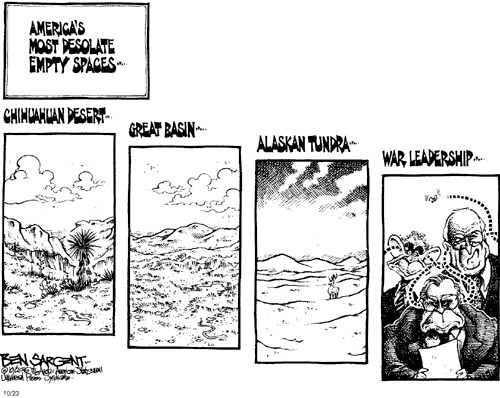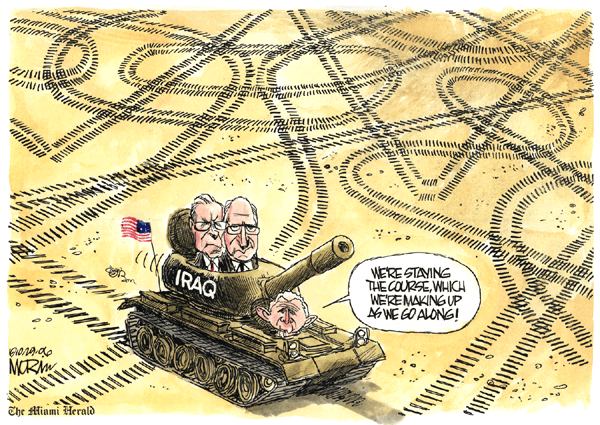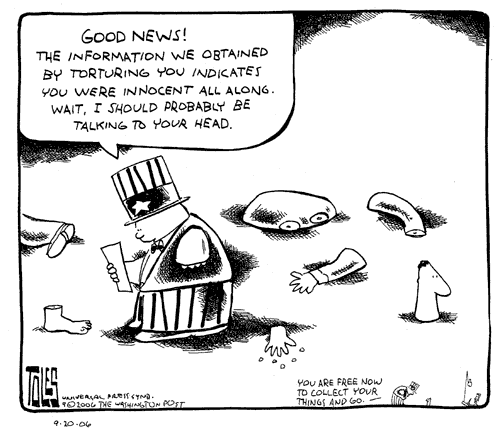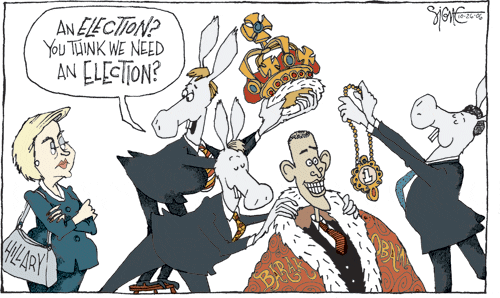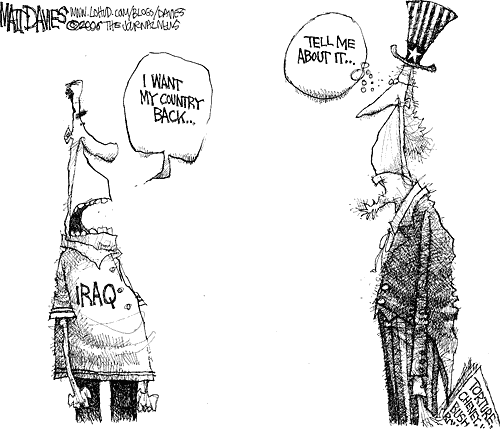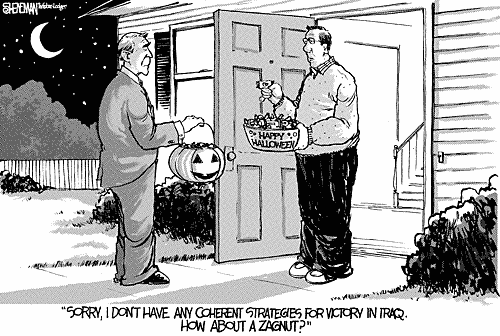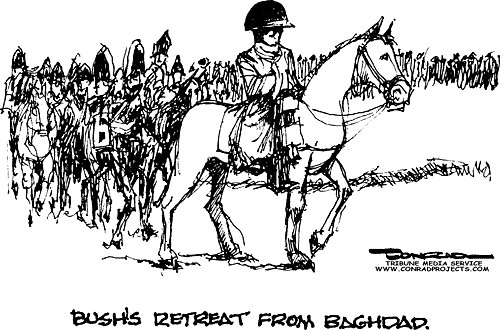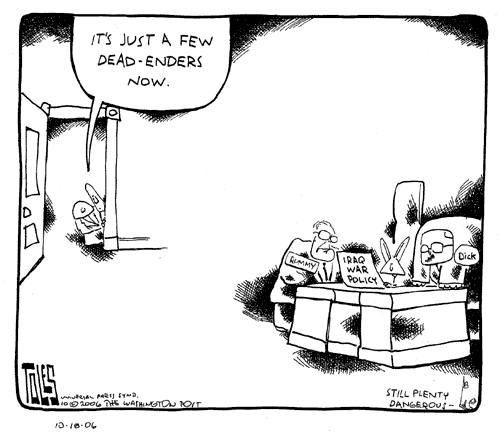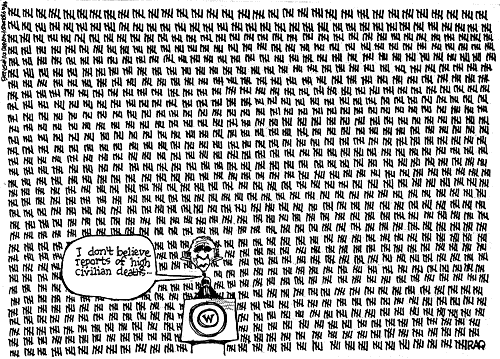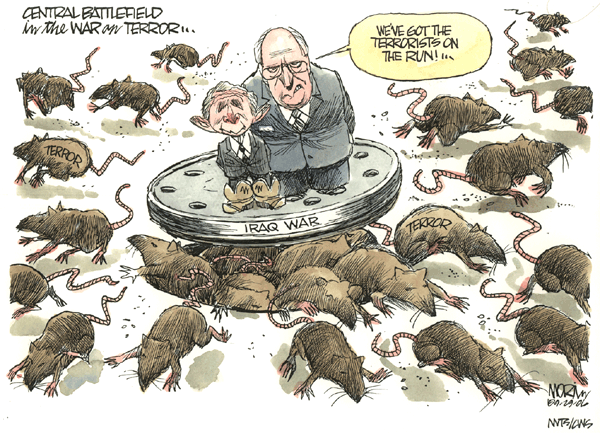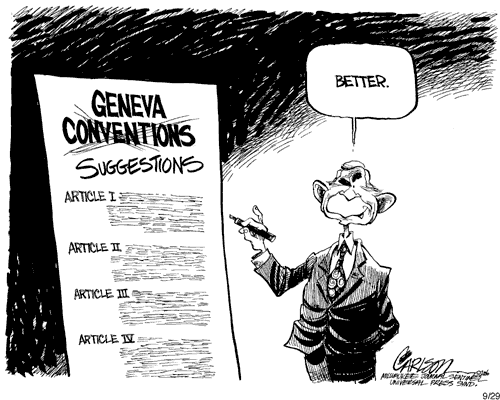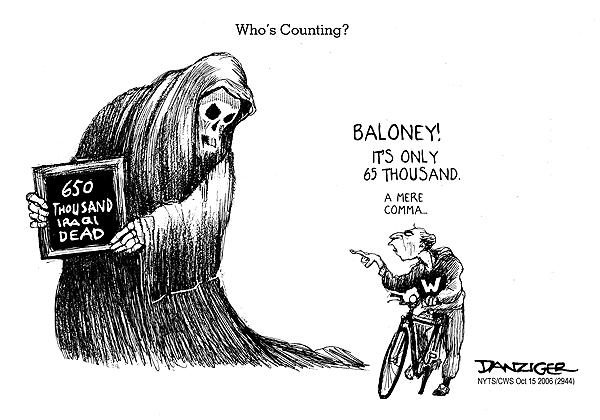BAGHDAD, Oct. 19 — The American-led crackdown in Baghdad has not succeeded in reducing a “disheartening” level of violence across the capital and a new approach is needed, a military spokesman said today.
Maj. Gen. William B. Caldwell IV, the senior spokesman for the American military in Iraq, said that the strategy of concentrating on a limited number of highly troubled neighborhoods had not slowed sectarian violence in the city as a whole.
General Caldwell said that attacks in the Baghdad area went up 22 percent during the first three weeks of Ramadan in comparison with the three weeks before.
The crackdown, which began in August, “has made a difference in the focus areas but has not met our overall expectations in sustaining a reduction in the level of violence,” General Caldwell said, adding that American commanders were consulting with the Iraqi government on a change in plans.
General Caldwell’s statement comes at a politically sensitive moment, when attacks on American forces have been increasing and many Democrats are making the situation in Iraq their central issue in the fall Congressional campaign.
The White House spokesman, Tony Snow, told reporters in Washington today that the general was not saying that the effort in Baghdad had been a failure.
“What he said is that the levels of violence had not been lowered in a way that met our expectations, and so what we’re doing is we’re adjusting to bring them down, which is what you’d expect,” Mr. Snow said.
The search for a new approach also comes at a time of increasing friction between the United States and the Iraqi government over how to deal with the Shiite militias that are responsible for much of the sectarian violence.
Prime Minister Nuri Kamal al-Maliki flew to the holy city of Najaf on Wednesday to plead for help from Iraq’s two most influential and enigmatic Shiite clerics, a sign of the seriousness of the crisis surrounding the Iraqi government.
The deaths of two more American soldiers were reported today, bringing the toll among United States forces for the month to at least 72, putting October on track to become one of the deadliest months of the war. One of the two died Wednesday of wounds suffered in combat in western Iraq, and the other died after his vehicle struck a roadside bomb Wednesday evening north of Balad, a city that had been the scene of a burst of sectarian killing over the weekend.
Two northern cities were struck by bombs today. In Mosul, two suicide truck bombs and a string of smaller attacks killed 22 people and wounded at least 54, according to the Interior Ministry, while Agence-France Presse reported that 12 people died and 68 were wounded by a suicide car bomber who targeted a line outside a bank.
In the country’s south, fighting broke out between Iraqi police and Shiite militia members in the city of Amara, according to the news agency, which said that three militia members and four civilians were killed.
In Baghdad, General Caldwell said that violence had begun to return to some of the areas that had been the focus of the crackdown, as Sunni insurgents and Al Qaeda “push back.”
He said their strategy seemed to be that “if you want to discredit this government, go back and strike at those areas” that officials have announced as newly peaceful.
He said that American forces had recently returned to the Dora neighborhood in southeastern Baghdad, which had been held up as one of the prime successes of the crackdown.
“Obviously the conditions under which we started are not the same today,” General Caldwell said.
In earlier statements, General Caldwell and other American commanders had called for patience, saying that the crackdown would take time to produce results.
General Caldwell did not explain what conditions had changed or say what new approaches were under consideration.
American officials have spoken in recent weeks about the splintering of Shiite militia groups and the growth of renegade bands linked to the Mahdi Army, the militia linked to Moktada al-Sadr, the anti-American cleric. The general cited a previous American estimate that 23 militias were now operating in the Baghdad area.
Early in the crackdown, American officials said they planned to extend it into Sadr City, the violent area of eastern Baghdad dominated by the Mahdi Army. But Mr. Maliki said recently that he had vetoed a request by the United States to move into Sadr City in force.
Tensions on the subject rose on Wednesday when Mr. Maliki ordered the release of a senior aide to Mr. Sadr who had been arrested on suspicion of complicity in death squads.
General Caldwell today declined to comment on the move, saying that “any limits the prime minister wants to impose on us, we have to abide by.”
The general also said that Mr. Maliki is pursuing strategic issues and “dialogues” and was “working at a much higher level.”
But the general said that the aide, Sheik Mazin al-Saidy, was released on the condition that he sign a promise not to participate in illegal activities.
The release had provoked a new wave of exasperation among American officials and military commanders, who have made little secret of their growing doubts about Mr. Maliki’s political will or ability to stop the killings.
Mr. Maliki returned to Baghdad on Wednesday without any clear breakthrough from his meeting in Najaf with Mr. Sadr and Grand Ayatollah Ali al-Sistani, Iraq’s most revered cleric.
Ayatollah Sistani, a peacemaker in previous confrontations between the American forces and Mr. Sadr, is widely viewed in Iraq as the only Shiite leader with the potential authority to subdue the Shiite militias.
As a leader of one of the Shiite religious blocs that lead the government, Mr. Maliki is regarded as a protégé of Ayatollah Sistani, but he is also politically indebted to Mr. Sadr, whose party holds a crucial bloc of seats in Iraq’s Parliament.
Mr. Maliki removed the country’s two most senior police commanders this week, in a major restructuring of the Shiite-led police forces, which have been widely accused of abetting death squads. American officials and some Iraqi leaders have demanded further changes.
But two news conferences in Najaf, one attended by Mr. Maliki and Mr. Sadr, and one attended by Mr. Maliki alone, produced no concrete agreements that might herald a truce by the Mahdi Army.
While Mr. Maliki cited “positive results” from his talks with Ayatollah Sistani and with Mr. Sadr, he offered no details. He said only that he had met with Ayatollah Sistani “so that that the security and political situation can be stabilized, and allow the government to turn its attention to reconstruction.”
“We are in a difficult security situation,” Mr. Maliki said. “All the political and religious figures in the country are talking about safeguarding our citizens and our homeland, stopping the bloodshed, and rebuilding the country. Everybody is waiting impatiently for these things.”
In his comments, Mr. Sadr, who rarely appears in public, restricted himself mainly to the broad disavowal of sectarian killings that he has made in the past, even as evidence has mounted of the Mahdi Army’s involvement in death-squad killings in Baghdad and elsewhere.
“I speak out now to condemn sectarianism of all kinds, including kidnapping and sectarian killing,” he said. “I call for the unity of all Iraqis, and Sunnis and Shiites to join together to rebuild Iraq and rescue the country from the seas of blood that are spilled every day.”
But the cleric, a volatile figure whose power rests on his command of thousands of militiamen and a political faction that provides a critical margin of support to the Maliki government in Parliament, rejected American demands for an early breakup of the militias, which have thrown the country into chaos.
“Only the Iraqi government has the right to act in these matters,” he said. “No one else has any right to intervene, neither the Americans nor any other country.”
Iraq’s national security adviser, Mowaffak al-Rubaie, declined to comment on the negotiations that led to the sheik’s release, but said the request, made by the prime minister himself, was part of a broader strategy to deal with Mr. Sadr politically.
“We believe there is room for political engagement with Moktada, and anything which would disrupt this political engagement will not be very constructive,” Mr. Rubaie said.
A fresh demonstration of the militias’ potential for destabilizing wide parts of the country came last weekend, when Shiite militiamen went on a killing rampage in and around the town of Balad, murdering 38 Sunnis in reprisal for the beheading by Sunni extremists of 19 Shiite workers.
Residents in the area said that some of the Shiite killers belonged to the Mahdi Army and had been dispatched from their stronghold in Shuala, where Sheik Saidy had been captured Tuesday.
And General Caldwell gave a new sense of the toll the continuing violence has taken on Iraq’s young security forces. He said that roughly 25,000 soldiers and police officers had been lost to service after being killed or wounded too badly to return to duty.
As a result, a batch of 10,000 new recruits is currently in training as replacements, and further batches of similar size are scheduled to begin training in December and February.
Kirk Semple reported from Baghdad and John O’Neil from New York. Reporting was contributed by Andy Lehren from New York, John F. Burns and Sabrina Tavernise from Baghdad, and Iraqi employees of The New York Times from Najaf and Balad.
